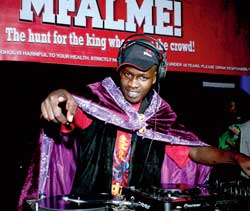As the Mfalme deejay competition threatens to go as flat as a beer left out in the hot sun, the turntable game continues with its musical, writes STEVENS MUENDO
Kicking off on a sluggish note this time and reigned by uncertainty, the future of Kenya’s biggest deejaying competition Pilsner Mfalme Competition stutters on. DJ Krowbar.

Trending Now
Popular this week